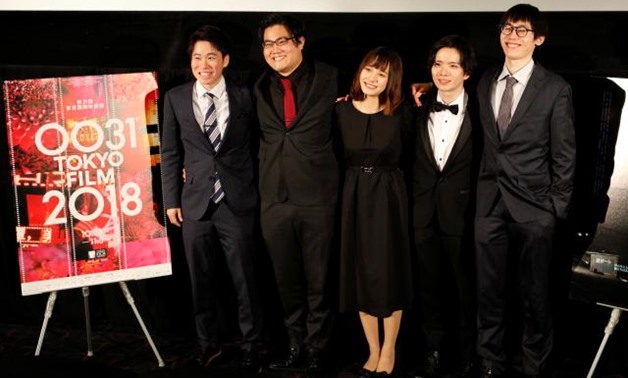
Director Kensei Takahashi (R) and cast members from "Sea", Seijyuro Mimori, Arisa Sato and Satoshi Abe and producer Taichi Tamura (L) attend a post-screening Q&A session after the film's world premiere at the 31st Tokyo International Film Festival in Toky
TOKYO (Reuters) - A young man suffers years of anguish after failing to stop the rape of a school girl in “Sea”, a gritty film of revenge and redemption by new Japanese director Kensei Takahashi.
“Sea” comes at a time of heightened awareness of sexual assault thanks to the #MeToo movement, although Takahashi said he had already begun developing the film before the Harvey Weinstein scandal broke last year.
Takahashi had originally envisaged a thriller-style film with the girl as the main character but decided on a male lead whose perspective he could better understand, which he said helped him to deepen the story and address themes like abandonment.
SPONSORED
“The thing I wanted to say most is that people are very indifferent about things that are happening to other people,” Takahashi told a question-and-answer session after the film’s premiere at the Tokyo International Film Festival, which runs until Saturday.
“Sea” follows Hiroshi (Satoshi Abe), a shy high-school student hoping to get into university, and get away from his dreary coastal hometown where he is bullied by the likes of Tatsuya (Seiya Okada) and Kengo (Seijyuro Mimori).
One day, life is irrevocably changed when he discovers Rie (Arisa Sato) being sexually assaulted by Tatsuya and Kengo in a boat shed on the beach but is powerless to stop them. The crime is never reported and Rie quietly leaves town.
Hiroshi retreats into a shell of guilt, toiling as a newspaper delivery person and avoiding contact with others. But a class reunion for 20-year-olds provides a chance encounter with the rapists - and an opportunity for vengeance.
Takahashi made “Sea” as his university graduation film but is already competing against established filmmakers in the festival’s Splash section for Japanese independent film, highlighting the director’s potential.
“They say you’re ‘new’ until your second film and that the second one is really important. So I want mine to be symbolic of me and hope to get into next year’s main competition section,” he said.

Comments
Leave a Comment